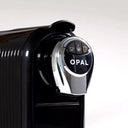
Recyclopedia
The search engine for your recycling needs...

Search for waste items below:
Introducing Halo’s Recyclopedia...a one stop shop to help you quickly understand what can and cannot be recycled within your home.
With concerns around the issue of climate change heightening, Halo is keen to help the UK improve its recycling rate, as 80% of UK households still place items in their recycling bin at home that cannot be recycled locally.
Halo’s Recyclopedia contains the top 20 items causing the most confusion at home. Utilising Google Search data to compile the most popular items that are causing confusion when recycling. It provides clear instructions on how to dispose of each item, whilst giving you a more sustainable alternative too.
Have a play around and try the Recyclopedia out for yourself!
Batteries

HOW TO DISPOSE:
Batteries can not be recycled at home. However, most major supermarkets have a battery drop off point located in store to dispose of them safely and conveniently during your weekly shop.
Failing that, you can take them to your local waste recycling site and dispose of them there.
SUSTAINABLE ALTERNATIVES:
There are many ways we can reduce the amount of batteries we are throwing away, Energizer Rechargeable Batteries are a great alternative.
You can also buy appliances that plug into the mains electricity, or even better, use renewable energy. For example, a wind-up radio or torch, or a solar powered calculator.
Select again:
Books

HOW TO DISPOSE:
Unfortunately, most hardback and paperback books cannot be recycled due to the glue used to bind them.
The best way to dispose of them consciously is to give them a new lease of life by gifting them to a friend, re-selling or donating.
SUSTAINABLE ALTERNATIVES:
Electronic books or devices such as the Kindle are a savvy and environmentally conscious way of reducing waste.
Equally, many of us already have access to millions of books at our fingertips, through popular apps such as Apple Books and Bookly on our smartphones.
Select again:
Bubble Wrap

HOW TO DISPOSE:
Bubble wrap is completely recyclable but cannot be thrown in with your normal household recycling.
The type of plastic used to make bubble wrap is much different to that of plastic bottles and containers and needs to be taken to a recycling centre to be sorted correctly.
SUSTAINABLE ALTERNATIVES:
Packing paper is a great alternative to bubble wrap as it provides the same (or better) amount of protection against bumps and drops but is much easier to recycle correctly.
You will find packing paper in your local DIY/stationary shop, but it can also be ordered easily online.
Select again:
Carrier Bags

HOW TO DISPOSE:
Carrier bags are now widely accepted in most household recycling collections, however it is best to check directly with your local authority.
Most carrier bags are designed for more than one use, but any that are not can usually be taken back to the supermarket to be recycled.
SUSTAINABLE ALTERNATIVES:
Since a change in the law, many supermarkets now provide reusable carrier bags (bags for life), and will accept and exchange these for new should they break at no extra cost.
However, a fabric tote bag provides a longer lasting solution - and they are often made using recycled fabrics.
Select again:
Clothes, shoes and bags

HOW TO DISPOSE:
To dispose of clothes and shoes that still have a bit of life left in them, locate your nearest charity shop.
Alternatively, for clothes and bedding that cannot be used again, it’s best to get creative and repurpose the fabric into something else, such as, old t-shirts make great cleaning rags.
SUSTAINABLE ALTERNATIVES:
Whilst it’s not realistic to stop buying clothing and bedding as they are an essential need, there are things we can take into consideration when purchasing.
For example, think about how eco-friendly the brand is. It is best to opt for a slow fashion brand producing small batches of clothing at once, or using recycled fabrics.
Select again:
Crisp Packets

HOW TO DISPOSE:
Most common crisp packets are made from metalised plastic, meaning they are not recyclable at home.
Recently, Walkers partnered with TerraCycle and launched the Crisp Packet Recycling Scheme which introduced 1,600 public drop off points to recycle crisps packets in the UK.
SUSTAINABLE ALTERNATIVES:
Dropping off at your local TerraCycle recycling point is still the best way to recycle your used crisp packets.
Walkers has a pledge to create a biodegradable packet by 2025 and KP has an initiative with TerraCycle and is using 23% less plastic packaging in its Hula Hoop multipacks.
Select again:
Coffee Pods

HOW TO DISPOSE:
Usually, single use coffee pods cannot be recycled at home. Some are compostable at-home but, it’s best to triple check the information on the packaging in case it needs to be sent to a treatment.
Some brands offer at-home collection through the recycling company TerraCycle.
SUSTAINABLE ALTERNATIVES:
Halo Coffee pods are a great
green alternative, the world’s first 100% compostable coffee pod made from sugar cane.
Halo Coffee pods are proven to entirely disintegrate in normal, loam garden soil in just 60 days, meaning after use they can be planted in your very own garden.
Select again:
Cutlery

HOW TO DISPOSE:
Unfortunately, metal cutlery usually cannot be recycled. The best way to dispose of old, unwanted cutlery is to clean and donate them to a new home.
Most charity shops will accept cutlery, but an even better way is to donate them to a deserving charity in need such as a local homeless shelter.
SUSTAINABLE ALTERNATIVES:
he best way to reduce waste is to invest in a cutlery that will last you a long time and avoid replacing it unless it is no longer usable.
However, you can purchase vintage, refurbished, second hand silverware sets on Etsy.
Select again:
CD or DVD cases

HOW TO DISPOSE:
Most CD’s and DVD’s can’t be recycled, but their plastic cases can be thrown in your household recycling bin or reused for craft projects or even to replace old broken cases.
SUSTAINABLE ALTERNATIVES:
The most sustainable option would be to avoid buying plastic cases and instead aim to source disks in cardboard cases instead.
Wherever possible, it’s best to listen to music and watch films on streaming services like Spotify and Netflix for a more waste free solution.
Select again:
Foil

HOW TO DISPOSE:
Clean household foil and aluminium is able to be recycled at home, however, it is best to check with your local recycling centre.
To recycle correctly crumbs or food residue must be removed and the foil should be scrunched into a loose ball before being thrown in the recycling bin.
SUSTAINABLE ALTERNATIVES:
To keep food fresher for longer, The Beeswax Wrap Co provides wax coated cloth that can be washed time after time, and moulded around crockery just like foil.
For cooking, placing an oven safe dish upside down over pots and pans creates a similar cooking environment, with zero waste.
Select again:
Greeting Cards

HOW TO DISPOSE:
Greetings cards are widely recyclable as long as they are relatively plain and contain no plastic film or coating.
Several of the big chain supermarkets offer services to recycle your Christmas cards after the festive period if you are having doubts over whether or not yours can be recycled.
SUSTAINABLE ALTERNATIVES:
E-cards aren’t an option for everybody. Companies like theseedcardcompany.com create beautiful compostable greetings cards for all occasions. Following the instructions, recipients can plant their card in soil and wait for beautiful wildflowers to sprout a few weeks later.
Select again:
Coat Hangers

HOW TO DISPOSE:
Recycling your coat hangers can be tricky, but not impossible.
There are often specific areas at your local recycling centres that accept coat hangers, both wire and plastic.
SUSTAINABLE ALTERNATIVES:
Avoid plastic and metal all together and opt for 100% recycled hangers made from biodegradable materials like these ones here from Hanger World.
These hangers are just as durable and reliable as they're plastic alternatives but much better for the planet.
Select again:
Ink Cartridges

HOW TO DISPOSE:
Despite frequent use in both homes and offices, the majority of ink cartridges still cannot be recycled at home.
However, many local retailers or supermarkets offer ink cartridge recycling services. How this works is that you can drop off your used cartridges during your weekly shop, or send them via post.
SUSTAINABLE ALTERNATIVES:
Many DIY stores will refill your existing cartridges for you, it is also possible to do this at home, with the help of online tutorials.
Of course, it is important to ensure you’re only printing whatever is necessary, to extend the life of your ink cartridges - this will also save you money!
Select again:
Kettles

HOW TO DISPOSE:
Kettles are a staple in most kitchens, but what happens when it needs replacing?
Thankfully many recycling centres and even electrical shops will take in your old kettles for recycling. Check with your local council to locate your nearest centre.
SUSTAINABLE ALTERNATIVES:
There are steps you can take to ensure you don’t replace kettles as frequently. It is best to purchase good quality products from a reputable brand as they are likely to last a while longer.
Many brands offer warranties and guarantees on their products, and will take your old products off your hands should they break.
Select again:
Mattresses

HOW TO DISPOSE:
Most mattresses are 100% recyclable, but you will need to manually dismantle it and recycle each part individually, and then take it to your local waste and recycling centre.
Some large retailers offer collections at home when purchasing a new one, which is both cost and time effective!
SUSTAINABLE ALTERNATIVES:
Silent Night’s Eco Comfort range has some great green alternatives, claiming to be fully recyclable and naturally flame retardant without the use of chemical treatment. The range pledges to prevent over 100 million plastic bottles from entering the sea.
However, the most sustainable way to dispose of your mattress is to find it a new home!
Select again:
Mobile Phones

HOW TO DISPOSE:
Smartphones are made of a variety of materials some recyclable some not. Common materials such as metal and plastic can be extracted and recycled but the process isn’t usually straightforward to complete at home.
When purchasing a new device, it’s best to ask the retailer if they offer a recycling service.
SUSTAINABLE ALTERNATIVES:
The best way to be certain that your mobile phone has the longest life cycle possible is to give it a new owner.
You can do this by gifting it a friend, donating it to charity or reselling it on a host of independent sites such as Music Magpie and Mazuma.
Select again:
Paint Cans

HOW TO DISPOSE:
Yes! Steel paint cans can be recycled easily, and can even be melted down multiple times without reducing quality. Steel is one of the most widely recycled materials in the UK.
If your cans are still full of paint, it becomes more tricky, we recommend allowing it to dry completely and disposing of it in your general waste bin.
SUSTAINABLE ALTERNATIVES:
Donating unwanted tins of paint to local charities or schools is a great way to ensure all of the product is being used and not wasted.
Alternatively, there are many organisations that take paint donations and use them to make new colours to be sold on, a quick Google and you will find your nearest location.
Select again:
Pizza Boxes

HOW TO DISPOSE:
There is a common misconception that pizza boxes cannot be recycled.
However, as long as you take time to ensure the plastic is free from food debris and oil, they can be thrown into your household recycling bin with the rest of your recyclables.
SUSTAINABLE ALTERNATIVES:
Instead of recycling your used pizza boxes, a great alternative is to use a compostable as it is as easy as planting your used pizza box in the garden and waiting for it to dissolve.
There is a range of retailers online that businesses can buy compostable pizza boxes from.
Select again:
Polystyrene Packaging

HOW TO DISPOSE:
The general answer is usually no, it cannot be thrown into your household recycling bin with the rest of your waste.
However, it is always best to double check with your local authority as some do accept it. Instead, the more sustainable choice is to opt for a greener alternative.
SUSTAINABLE ALTERNATIVES:
For fast food and takeaway packaging a more eco conscious alternative is Kraft Paper boxes as it is made from a range of ntural wood.
Hoever, the most sustainable option is to use reusable packaging. Just like taking our own mugs to the coffee shop, we can do the same for food on the go.
Select again:
Wrapping Paper

HOW TO DISPOSE:
Wrapping paper comes in all kinds of materials, and it can be confusing figuring out if it can be recycled.
Simply scrunch the wrapping paper in your hand, if it retains its shape it can be recycled, but if it springs back to life it’s likely mixed with plastic and must be disposed of in the general bin.
SUSTAINABLE ALTERNATIVES:
Reusable gift wrap is now widely available and a perfect alternative to single use wrapping paper.
Companies like wragwrap.com offer reusable fabric wrapping paper in a range of beautiful patterns and multiple sizes.
Select again:







